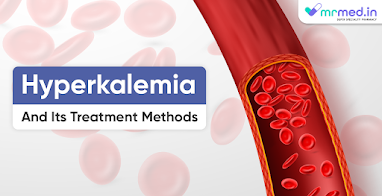Hyperkalemia and its treatment methods

A medical disease known as hyperkalemia is characterized by very high potassium levels in the blood. A vital electrolyte, potassium, is essential for the healthy operation of the heart, muscles, and neurons. However, when potassium levels rise too high, it can interfere with the heart's typical electrical activity and cause potentially fatal consequences. The average range for normal blood potassium levels is 3.5 to 5.0 milliequivalents per liter (mEq/L). A potassium level over 5.0 mEq/L is commonly referred to as hyperkalemia. Medicines: Several medications, including ACE inhibitors, angiotensin receptor blockers (ARBs), nonsteroidal anti-inflammatory medicines (NSAIDs), and potassium-sparing diuretics, can raise potassium levels. Overconsumption of potassium: Hyperkalemia can result from too much potassium, especially in people with compromised kidney function. Acute tissue damage: The release of potassium into the circulation can result from severe burns, traumatic injuries, or...
